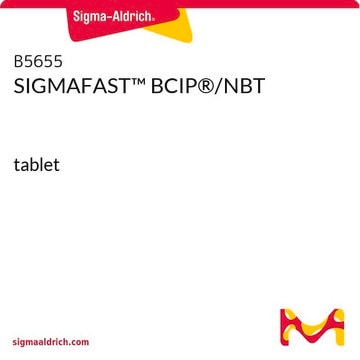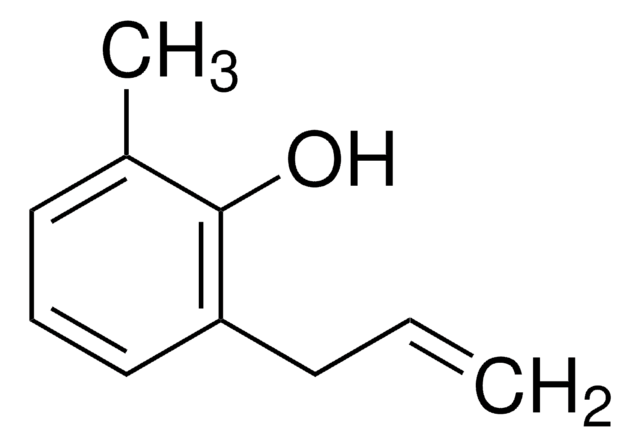16670
5-Bromo-4-chloro-3-indolyl phosphate p-toluidine salt
≥95.0% (HPLC), powder
Synonym(s):
BCIP® p-toluidine salt, X-phosphate p-toluidine salt
About This Item
Recommended Products
product name
5-Bromo-4-chloro-3-indolyl phosphate p-toluidine salt, ≥95.0% (HPLC)
Assay
≥95.0% (HPLC)
form
powder
storage temp.
2-8°C
SMILES string
Cc1ccc(N)cc1.OP(O)(=O)Oc2c[nH]c3ccc(Br)c(Cl)c23
InChI
1S/C8H6BrClNO4P.C7H9N/c9-4-1-2-5-7(8(4)10)6(3-11-5)15-16(12,13)14;1-6-2-4-7(8)5-3-6/h1-3,11H,(H2,12,13,14);2-5H,8H2,1H3
InChI key
QEIFSLUFHRCVQL-UHFFFAOYSA-N
Looking for similar products? Visit Product Comparison Guide
Application
BCIP is provided in two salt forms: the disodium salt which is soluble in water and the p-toluidine form which is soluble in dimethylformamide. These salt forms may be used to prepare a stock solution that in combination with NBT and a reaction buffer, form a substrate solution for alkaline phosphatase. This substrate system, when incubated with alkaline phosphatase, produces an insoluble NBT diformazan product that is easily observable with its purple color. For added convenience, a mixture of BCIP and NBT is provided in an easily dissolvable tablet form or as a ready-to-use liquid.
Substrates
Legal Information
Storage Class Code
11 - Combustible Solids
WGK
WGK 3
Flash Point(F)
Not applicable
Flash Point(C)
Not applicable
Personal Protective Equipment
Certificates of Analysis (COA)
Search for Certificates of Analysis (COA) by entering the products Lot/Batch Number. Lot and Batch Numbers can be found on a product’s label following the words ‘Lot’ or ‘Batch’.
Already Own This Product?
Find documentation for the products that you have recently purchased in the Document Library.
Customers Also Viewed
Our team of scientists has experience in all areas of research including Life Science, Material Science, Chemical Synthesis, Chromatography, Analytical and many others.
Contact Technical Service






